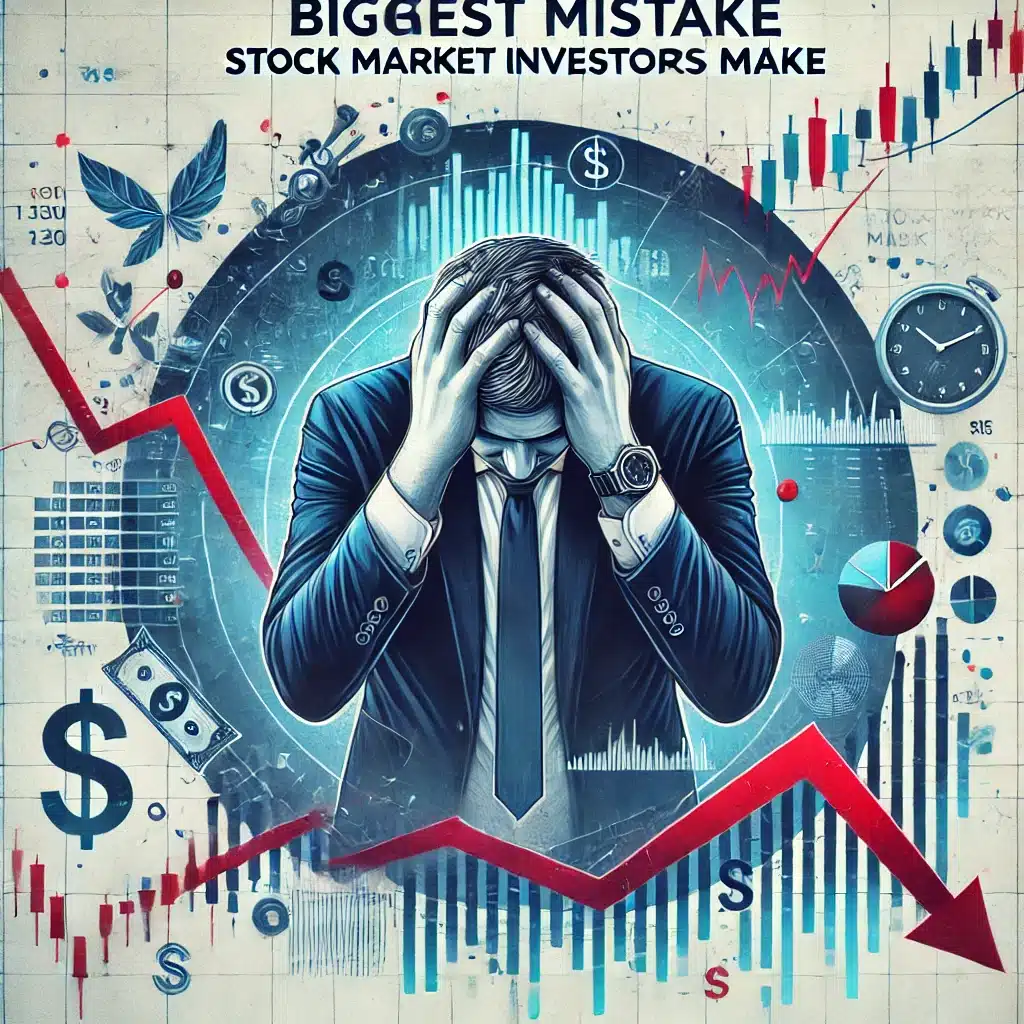What’s the The 8 Biggest Mistake That Stock Market Investors Make?

Fundamental Analysis
What’s the Biggest Mistake That Stock Market Investors Make?
The Biggest Mistake That Stock Market Investors Make. The stock market is popularly associated with opportunities to make a fortune however one can lose such a fortune because of poor conduct. Today, I am going to make a discretionary move — I am going to share the largest avoidable mistake that stock market investors commit and give you the ways not to make it. Knowing these potential problems will help you ensure your long-term success throughout your investment years.
Introduction: Navigating the Stock Market’s Challenges
Stock trading is a fun and exciting activity but often accompanied by fear and worry. It promises financial growth, yet it is accompanied by specific risks. In these conditions, many investors unwittingly make fatal errors. If you want to improve your investment decisions, learning what is wrong with them is a key factor.
Well, what is involved then as the biggest blunder that shares investors are bound to execute? The answer is that emotions rule, little research is done, and no proper long-term plans are conceived. Let’s dive deeper.
1. Emotional Decision-Making: The Silent Portfolio Killer
Actually, one of the fatal sins that stock market investors make is the inability to control their emotions while investing. The main causes are therefore fear and greed.
How Fear Impacts Decisions
- Panic Selling: As for bear markets fear of deeper declines forces people to sell in the wrong time, thereby ensuring that they book a loss.
- Herd Mentality: This is because, during sell-offs, many investors fold to pressure and increase their losses even further.
The Role of Greed
- Overtrading: Self-interest can cause over-trading which hikes transaction costs and reduces potential income.
- Chasing Trends: One of the worst things you can do is enter ‘hot stocks’ and have no clue about what you are actually investing in.
Solution: Try to avoid letting your emotions influence your decisions and keep close to the investment strategy that should have been previously designed. Learn to remain calm and keep from emotionally reacting to short-term oscillation in the market.
2. Neglecting Research and Analysis
Another common and the biggest mistake that stock market investors make is to lack of research. Some people invest in shares based on rumors or hearsay, or their friend’s or relatives ‘tips without even knowing the firm.
Why Research Matters
- Informed Decisions: It is important to have knowledge of a company’s income statement, balance sheet, and statement of cash flows, market standing, and growth prospects.
- Risk Mitigation: By doing research, people are able to have clues that may hinder a company’s performance.
Common Research Pitfalls
- Using social media accounts as the main source when it comes to getting insights on the best-performing stocks.
- Lack of attention to diversification as an important strategy.
- Misinterpreting financial metrics like P/E ratios and earnings reports.
Solution: Exercise due diligence in your research before you can partner with someone in any investment program.
3. Overlooking the Importance of Diversification
Putting all your eggs in one basket is a recipe for disaster. Concentrated portfolios are extremely vulnerable to market volatility.
Why Diversification Matters
- Risk Distribution: Spreading investments across various asset classes minimizes the impact of poor performance in any single sector.
- Stable Returns: A diversified portfolio balances high-risk and low-risk investments, leading to consistent returns over time.
Solution: Diversify your portfolio by investing in a mix of stocks, bonds, ETFs, and mutual funds. Consider industries, geographies, and market capitalizations to achieve optimal balance.
4. Timing the Market
Trying to predict market movements is an exercise in futility for most investors. Despite this, many attempt to time the market, which often leads to significant losses.
Why Market Timing Fails
- Unpredictable Markets: Even seasoned investors struggle to forecast short-term price movements.
- Opportunity Cost: Waiting for the “perfect time” often results in missed opportunities for growth.
Solution: Adopt a strategy of dollar-cost averaging, where you invest a fixed amount regularly, regardless of market conditions. This minimizes the impact of market volatility.
5. Ignoring Long-Term Goals
Short-term thinking is another one of the biggest mistakes that stock market investors make. Many investors focus on immediate gains, neglecting their long-term financial objectives.
Consequences of Short-Term Thinking
- Frequent trading leads to high transaction costs.
- Impulsive decisions often undermine long-term growth.
Solution: Define clear financial goals before investing. Focus on building a portfolio that aligns with your long-term objectives, such as retirement or funding a child’s education.
6. Mismanagement of Risk
Risk is an inherent part of investing, yet many investors fail to manage it effectively.
Common Risk Management Errors
- Over-leveraging through margin trading.
- Ignoring the importance of an emergency fund.
- Holding on to underperforming stocks due to emotional attachment.
Solution: Assess your risk tolerance and invest accordingly. Avoid overexposure to volatile stocks and ensure you have a financial safety net in place.
7. Lack of Financial Education
The stock market can be complex, and a lack of financial literacy often leads to poor investment decisions.
Why Education is Key
- Understanding market dynamics enables informed choices.
- Familiarity with financial concepts reduces reliance on external advice.
Solution: Invest time in learning about the stock market. Consider books, online courses, and seminars to enhance your knowledge.
8. Overlooking the Power of Compounding
Many investors underestimate the power of compounding, which can significantly boost wealth over time. Selling investments too early disrupts this compounding effect.
Solution: Stay invested for the long haul. Reinvest dividends and allow your portfolio to grow exponentially over time.
Conclusion
The stock market can be a powerful tool for wealth creation, but it requires a disciplined and informed approach. The biggest mistake that stock market investors make often stems from emotional decision-making, inadequate research, and a lack of long-term vision. By recognizing these pitfalls and adopting a strategic mindset, you can navigate the complexities of the market and achieve your financial goals.
Remember, successful investing isn’t about timing the market—it’s about time in the market.
FAQs
1. What is the biggest mistake that stock market investors make?
The biggest mistake that stock market investors make is letting emotions drive their decisions, leading to poor choices like panic selling and overtrading.
2. How can I avoid emotional investing?
Stick to a well-defined investment plan, and focus on long-term goals instead of reacting to short-term market fluctuations.
3. Why is diversification important?
Diversification reduces risk by spreading investments across different assets, sectors, and geographies.
4. Can I rely on social media for stock tips?
While social media can provide insights, relying solely on it is risky. Always verify information through reliable sources.
5. How can I start managing risk better?
Assess your risk tolerance, diversify your portfolio, and avoid leveraging excessively.
Disclaimer
This article is for informational purposes only and does not constitute financial advice. Investing in the stock market involves risk, and past performance is not indicative of future results. Always consult with a licensed financial advisor before making investment decisions.
Table of Contents
- What’s the Biggest Mistake That Stock Market Investors Make?
- Introduction: Navigating the Stock Market’s Challenges
- 1. Emotional Decision-Making: The Silent Portfolio Killer
- 2. Neglecting Research and Analysis
- 3. Overlooking the Importance of Diversification
- 4. Timing the Market
- 5. Ignoring Long-Term Goals
- 6. Mismanagement of Risk
- 7. Lack of Financial Education
- 8. Overlooking the Power of Compounding
- Conclusion
- FAQs
- Disclaimer


One thought on “What’s the The 8 Biggest Mistake That Stock Market Investors Make?”